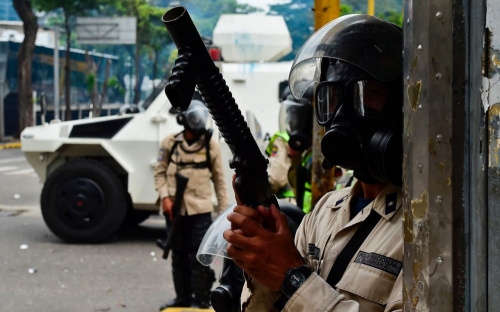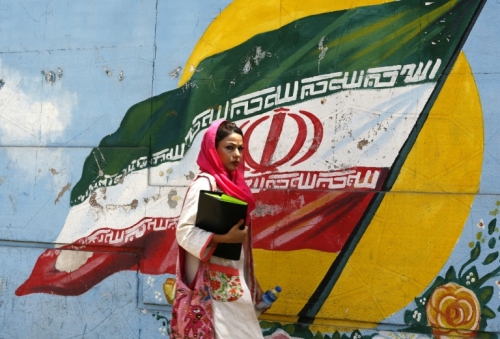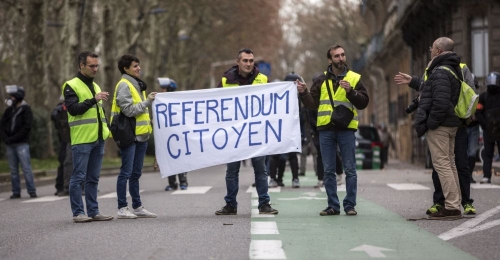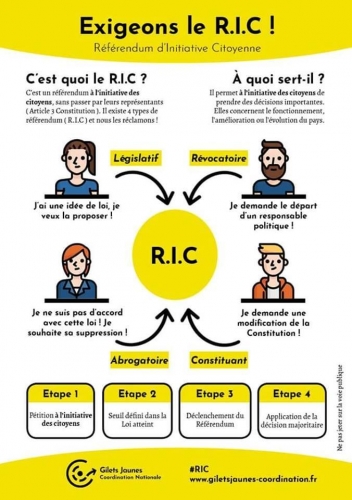La semaine dernière, Trump, son vice-président Mike Pence, le directeur du département d’État américain Mike Pompeo et le conseiller à la sécurité nationale John Bolton, ainsi qu’un groupe de pays d’Amérique centrale, qui sont grosso modo des colonies américaines et qui n’ont pas de politique étrangère propre, ont annoncé, en même temps, que le Venezuela avait un nouveau président : une non-entité virtuelle nommée Juan Guaidó, qui ne s’était jamais présenté à ce poste, mais qui a été en quelque sorte formé pour ce poste aux États-Unis. Guaidó est apparu lors d’un rassemblement à Caracas, flanqué d’une petite clique de flagorneurs très bien rémunérés. Il avait l’air très effrayé lorsqu’il s’est autoproclamé président du Venezuela et s’est mis à remplir ses fonctions présidentielles en allant se cacher immédiatement.
On ne savait pas où il se trouvait jusqu’à ce qu’il fasse surface lors d’une conférence de presse, au cours de laquelle il n’a pas répondu à la question de savoir s’il avait été contraint de se déclarer président ou s’il l’avait fait de son propre gré, sans hésiter. Il y a beaucoup de choses à la fois tragiques et comiques dans cette histoire, alors démontons-la morceau par morceau. Ensuite, nous passerons à la question de savoir pourquoi le Venezuela doit être détruit (du point de vue de l’establishment américain).
Ce qui ressort immédiatement, c’est la combinaison de l’incompétence et du désespoir dont font preuve toutes les personnalités publiques et non-publiques mentionnées ci-dessus. Pompeo, en exprimant sa reconnaissance à Guaidó, l’appelant “guido”, qui est une insulte ethnique contre les Italiens, tandis que Bolton a fait mieux en l’appelant “guiado”, cequi pourrait être compris en espagnol par “contrôlé à distance”. Pour ne pas être en reste, Pence a prononcé tout un petit discours sur le Venezuela – une sorte d’adresse au peuple vénézuélien – qui était truffé d’un pseudo charabia espagnol vraiment atroce et qui s’est terminé par un “¡Vaya con Dios !”tout à fait incongru, comme sorti d’un western des années 1950.
Le Conseil de sécurité de l’ONU a également été l’occasion de se divertir, le représentant russe Vasily Nebenzya, toujours redoutable, soulignant que la situation au Venezuela ne constituait pas une menace pour la sécurité internationale et ne relevait donc pas de la compétence du Conseil de sécurité. Il posa ensuite une question pointue à Pompeo, qui était présent à la réunion : « Les États-Unis envisagent-ils de violer une fois de plus la Charte des Nations Unies ? ».
Pompeo n’a pas donné de réponse. Il s’est assis là, ayant l’air d’un chat qui fait semblant de ne pas mâcher un canari, puis il s’est rapidement enfui. Mais tout récemment, alors qu’il sortait probablement d’une réunion sur la sécurité nationale et se rendait à pied à une conférence de presse de la Maison-Blanche, Bolton a accidentellement montré son bloc-notes devant les caméras des journalistes. On y trouvait les mots “5000 soldats en Colombie”(il s’agit d’une base militaire/colonie de narcotrafiquants américaine à la frontière nord du Venezuela). Était-ce un moment de sénilité de Bolton ? Quoi qu’il en soit, cela semble répondre par l’affirmative à la question de Nebenzya. La nomination au poste d’envoyé spécial au Venezuela d’Elliott Abrams, un criminel reconnu coupable d’être complice de la précédente tentative de coup d’État au Venezuela contre Hugo Chávez, ce qui l’a automatiquement rendu persona non grataau Venezuela, est également un signe d’intention hostile.
Il serait tout à fait pardonnable que vous confondiez cette opération de changement de régime avec une sorte de performance d’art abscon. C’est certainement un peu trop abstrait pour les complexités du monde réel de l’ordre international. Un pauvre larbin effrayé est projeté devant une caméra et se déclare président de Narnia, puis trois larbins (Pence, Pompeo et Bolton) et Bozo le Trump sautent tous sur l’occasion et crient “Oui-oui-oui, c’est sûrement lui”! Et un retraité qui a déjà raté son coup est sorti de sa maison de retraite, dépoussiéré et envoyé en mission dans un pays qui ne veut pas de lui.
Pendant ce temps, dans le monde réel, l’armée vénézuélienne et les tribunaux vénézuéliens restent fermement derrière le président élu Nicolas Maduro et une liste de pays qui constituent la grande majorité de la population mondiale, dont la Chine ; la Russie ; l’Inde ; le Mexique ; la Turquie ; l’Afrique du Sud et quelques autres parlent d’un soutien à Maduro. Même les habitants des pays d’Amérique centrale contrôlés à distance savent très bien à quel point une telle opération de changement de régime créerait un dangereux précédent si elle devait réussir, et ils se disent : “Bon là c’est le Venezuela, demain, ça sera notre tour !”.
Pour être complet, examinons les arguments utilisés pour faire avancer cette opération de changement de régime. Certains prétendent que Nicolas Maduro n’est pas un président légitime parce que les élections de l’année dernière, où il a été soutenu par 68% des électeurs, ont manqué de transparence et ont été boycottées par certains partis d’opposition, alors que la déclaration de Juan Guaidó est 100% légale malgré lui et son Assemblée nationale sans importance qui, selon les sondages de l’opposition, est contestée par 70% des Vénézuéliens. Il y a également eu des allégations non-fondées de “bourrage des urnes” – du fait notamment que les Vénézuéliens n’utilisent pas de bulletins de vote en papier, alors que selon l’observateur électoral international et ancien président américain Jimmy Carter, “le processus électoral au Venezuela est le meilleur au monde”.

Certains prétendent que Maduro a mal géré l’économie vénézuélienne, ce qui a entraîné une hyperinflation, un taux de chômage élevé, une pénurie de produits de base (notamment de médicaments) et une crise des réfugiés. Il y a du vrai dans ces affirmations, mais nous devons aussi noter que certains voisins du Venezuela font encore pire à bien des égards, même si Maduro n’est pas leur président. En outre, de nombreuses difficultés économiques du Venezuela ont été causées par les sanctions américaines à son encontre. Par exemple, à l’heure actuelle, environ 8 milliards de dollars de l’argent du Venezuela sont bloqués, destinés à financer une armée mercenaire qui devrait envahir et tenter de détruire le Venezuela comme cela a été fait avec la Syrie.
Enfin, une grande partie de la situation difficile du Venezuela est liée à la malédiction du pétrole. Le Venezuela possède les plus grandes réserves de pétrole au monde, mais son pétrole est très visqueux et donc coûteux à produire. Pendant une période où le prix du pétrole était élevé, les Vénézuéliens sont devenus dépendants des largesses pétrolières que le gouvernement avait l’habitude d’utiliser pour sortir des millions de personnes d’une pauvreté abjecte et de les faire sortir des bidonvilles pour les mettre dans des logements sociaux. Et maintenant, le prix beaucoup plus bas du pétrole a provoqué une crise. Si le Venezuela parvient à survivre à cette période, il sera en mesure de se redresser une fois que les prix du pétrole se seront redressés (ce qui sera le cas une fois que le foutu système de Ponzi aux États-Unis aura fait son temps). Nous reviendrons plus tard sur le pétrole vénézuélien.
En passant, beaucoup de gens ont exprimé l’opinion que les malheurs du Venezuela sont dus au socialisme. Selon eux, c’est bien si beaucoup de gens souffrent tant que leur gouvernement est capitaliste, mais s’il est socialiste, ce n’est pas le bon type de souffrance et leur gouvernement mérite d’être renversé, même si tous ont voté pour lui. Par exemple, le site ZeroHedge, qui publie souvent des informations et des analyses utiles, a poussé cette ligne de pensée ad nauseam. Il est malheureux que certaines personnes s’imaginent qu’elles ont des principes et qu’elles ont raison alors qu’elles ne sont au mieux que des idiots stupides et au pire des idiots utiles. Ce n’est pas à elles de décider de la politique des autres nations et elles devraient cesser de nous faire perdre notre temps avec leurs absurdités.
Cette tentative bien visible de changement de régime créerait un précédent très dangereux pour les États-Unis eux-mêmes. La doctrine de la jurisprudence n’est nullement universelle. Elle nous vient du sombre âge de la common lawtribale anglaise et n’est suivie que dans les anciennes colonies britanniques. Pour le reste du monde, c’est une forme barbare d’injustice parce qu’elle accorde un pouvoir arbitraire aux juges et aux avocats. Les tribunaux ne doivent pas être autorisés à écrire ou à modifier des lois, mais seulement à les suivre. Si votre cause peut être tranchée en fonction d’une autre cause qui n’a rien à voir avec vous, alors pourquoi ne pas laisser quelqu’un d’autre payer vos frais juridiques et vos amendes et purger votre peine pour vous ? Mais il existe un principe fondamental du droit international, à savoir que les nations souveraines ont le droit de respecter leurs propres lois et traditions juridiques. Par conséquent, les États-Unis seront liés par les précédents qu’ils établissent. Voyons comment ça marcherait.
Le précédent établi par la reconnaissance de Juan Guaidó par le gouvernement américain permet à Nicolas Maduro de déclarer la présidence de Donald Trump illégitime pour pratiquement toutes les mêmes raisons. Trump n’a pas réussi à remporter le vote populaire, mais n’a obtenu la présidence qu’en raison d’un système électoral corrompu et truffé d’irrégularités. En outre, certains candidats de l’opposition ont été traités injustement au cours du processus électoral. Trump est aussi une honte et un échec : 43 millions de personnes vivent grâce à des coupons alimentaires ; près de 100 millions font partie des chômeurs de longue durée (pudiquement appelés des « sans emploi ») ; la situation des sans-abris est endémique et des villages entiers de tentes sont apparus dans plusieurs villes américaines ; de nombreuses entreprises américaines sont au bord de la faillite ; et Trump ne semble même pas être capable de maintenir le gouvernement fédéral ouvert ! C’est un désastre pour son pays ! Maduro reconnaît donc Bernie Sanders comme le président légitime des États-Unis.

Vladimir Poutine pourrait alors s’appuyer sur ces deux précédents en reconnaissant également Bernie Sanders comme le président américain légitime. Dans un discours public, il pourrait dire ce qui suit : « J’admets librement que nous avons installé Donald Trump en tant que président américain, comme c’était notre droit sur la base des nombreux précédents établis par les États-Unis eux-mêmes. Malheureusement, l’expérience Trump n’a pas fonctionné comme prévu. Mueller peut prendre sa retraite, car cette clé USB contient tout ce qui est nécessaire pour annuler l’intronisation de Trump. Donny, désolé que ça n’ait pas marché ! Ton passeport russe est prêt, tu peux le retirer à notre ambassade, tout comme les clés de ta chambre à Rostov, juste à côté de l’ancien président ukrainien Viktor Ianoukovitch qui a été violemment changé-de-régime par votre prédécesseur Obama. »
Pourquoi cette hâte inconvenante à faire sauter le Venezuela ?L’explication est simple : il s’agit du pétrole. « Cela fera une grande différence pour les États-Unis sur le plan économique si les compagnies pétrolières américaines peuvent investir et produire du pétrole au Venezuela », a déclaré John Bolton dans une émission sur Fox News. Vous voyez, le pétrole vénézuélien ne peut être produit de façon rentable sans des prix élevés du pétrole – si élevés que de nombreux consommateurs dépendant du pétrole feraient faillite – mais il peut certainement être produit en quantités beaucoup plus importantes et avec d’énormes pertes financières.
D’énormes pertes financières ne gêneraient certainement pas les compagnies pétrolières américaines qui ont jusqu’à présent généré une perte de 300 milliards de dollars en utilisant la fracturation hydraulique, financée par le pillage de l’épargne-retraite des américains, en imposant aux générations futures une lourde dette et d’autres plans néfastes. N’oubliez pas non plus que le plus gros consommateur de pétrole au monde est le ministère américain de la Défense, et s’il doit payer un peu plus cher pour le pétrole afin de continuer à faire exploser des pays, il le fera. Ou plutôt, vous le ferez. C’est la même chose pour eux. Les États-Unis sont déjà bien au-delà de la faillite, mais leurs dirigeants sont prêts à tout pour faire durer la fête pendant encore quelques temps.
Voilà le vrai problème : la fête autour du pétrole de schiste se termine. La plupart des puits les plus productifs ont déjà été exploités ; les nouveaux puits s’épuisent plus rapidement et produisent moins tout en coûtant plus cher ; les prochaines vagues de fracturation, si elles se produisaient, gaspilleraient 500 milliards de dollars, puis 1 000, puis 2 000… Le rythme de forage ralentit déjà et a commencé à ralentir même lorsque les prix du pétrole étaient encore élevés. Pendant ce temps, le pic de production de pétrole conventionnel (non fracturé) a eu lieu en 2005-2006 et seuls quelques pays n’ont pas encore atteint leur pic. La Russie a annoncé qu’elle commencerait à réduire sa production dans seulement deux ans et l’Arabie saoudite n’a plus de capacité disponible.
Une pénurie de pétrole assez importante s’annonce, et elle affectera plus particulièrement les États-Unis, qui brûlent 20% du pétrole mondial (avec seulement 5% de la population mondiale). Une fois l’effondrement survenu, les États-Unis passeront de 2,5 millions de barils par jour devant être importés à au moins 10 millions de barils devant entre importés, mais ce pétrole n’existera plus. Auparavant, les États-Unis étaient capables de résoudre ce problème en faisant exploser des pays et en volant leur pétrole : la destruction de l’Irak et de la Libye a permis aux compagnies pétrolières américaines de se remettre sur pied pendant un certain temps et a empêché l’effondrement du système financier. Mais l’effort pour faire sauter la Syrie a échoué, et la tentative de faire sauter le Venezuela est susceptible d’échouer aussi parce que, gardez cela à l’esprit, le Venezuela a entre 7 et 9 millions de Chavistes imprégnés de l’esprit révolutionnaire bolivarien, une armée importante et bien équipée et ce pays est généralement d’un voisinage très dur.
Auparavant, les États-Unis avaient eu recours à diverses ruses pour légitimer leur agression contre les pays riches en pétrole et le vol subséquent de leurs ressources naturelles. Il y avait cette fiole de talc hautement toxique que Colin Powell a secouée à l’ONU pour que le Conseil de sécurité votait en faveur de la destruction de l’Irak et du vol de son pétrole. Il y a eu l’histoire inventée d’atrocités humanitaires en Libye pour obtenir les votes en faveur d’une zone d’exclusion aérienne (qui s’est avérée être une campagne de bombardements suivie d’un renversement du gouvernement). Mais avec le Venezuela, il n’y a pas de feuille de vigne. Tout ce que nous avons, ce sont des menaces ouvertes d’agression pure et des mensonges flagrants auxquels personne ne croit, livrés maladroitement par des clowns, des larbins et des vieux sur le retour.
Si le plan A (voler le pétrole vénézuélien) échoue, alors le plan B est de prendre tous vos chiffons de papier libellés en dollars américains – espèces ; actions ; obligations ; actes ; polices d’assurance ; billets au porteur, etc. et de les brûler dans des poubelles pour essayer de rester au chaud. Il y a une nette bouffée de désespoir dans toute cette affaire. L’hégémonie mondiale est brisée ; elle est tombée et ne peut plus se relever.
S’il reste un doute dans votre esprit sur la raison pour laquelle le Venezuela doit être détruit, et pourquoi le peuple vénézuélien ne compte pas du tout, c’est Trump lui-même qui l’a dit.
(Le 29 janvier 2019, Club Orlov– Traduction du Sakerfrancophone.)







 del.icio.us
del.icio.us
 Digg
Digg





 Face à ce que le porte-parole du gouvernement Benjamin Griveaux a qualifié d’«agitateurs» et d’«insurgés» voulant «renverser le gouvernement», le Premier ministre Edouard Philippe a annoncé une nouvelle «loi pour mieux protéger le droit de manifester». Sa principale mesure: punir sévèrement les organisateurs d’une manifestation dont l’heure et le lieu n’ont pas été officiellement approuvés.
Face à ce que le porte-parole du gouvernement Benjamin Griveaux a qualifié d’«agitateurs» et d’«insurgés» voulant «renverser le gouvernement», le Premier ministre Edouard Philippe a annoncé une nouvelle «loi pour mieux protéger le droit de manifester». Sa principale mesure: punir sévèrement les organisateurs d’une manifestation dont l’heure et le lieu n’ont pas été officiellement approuvés.